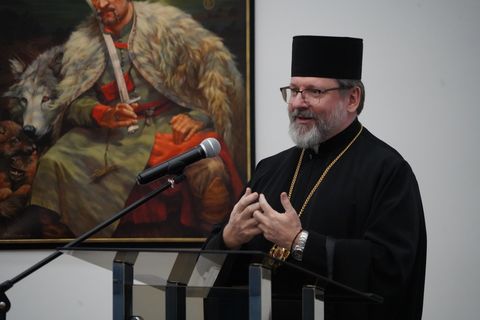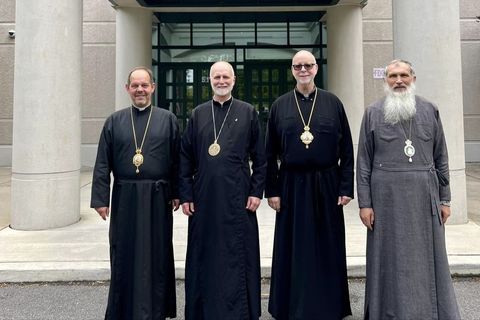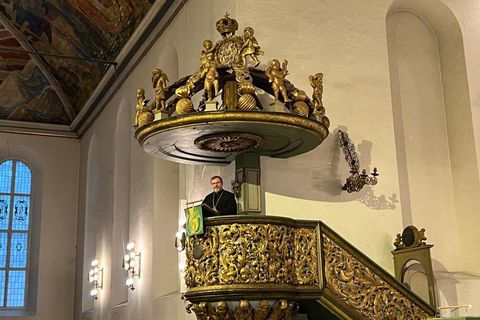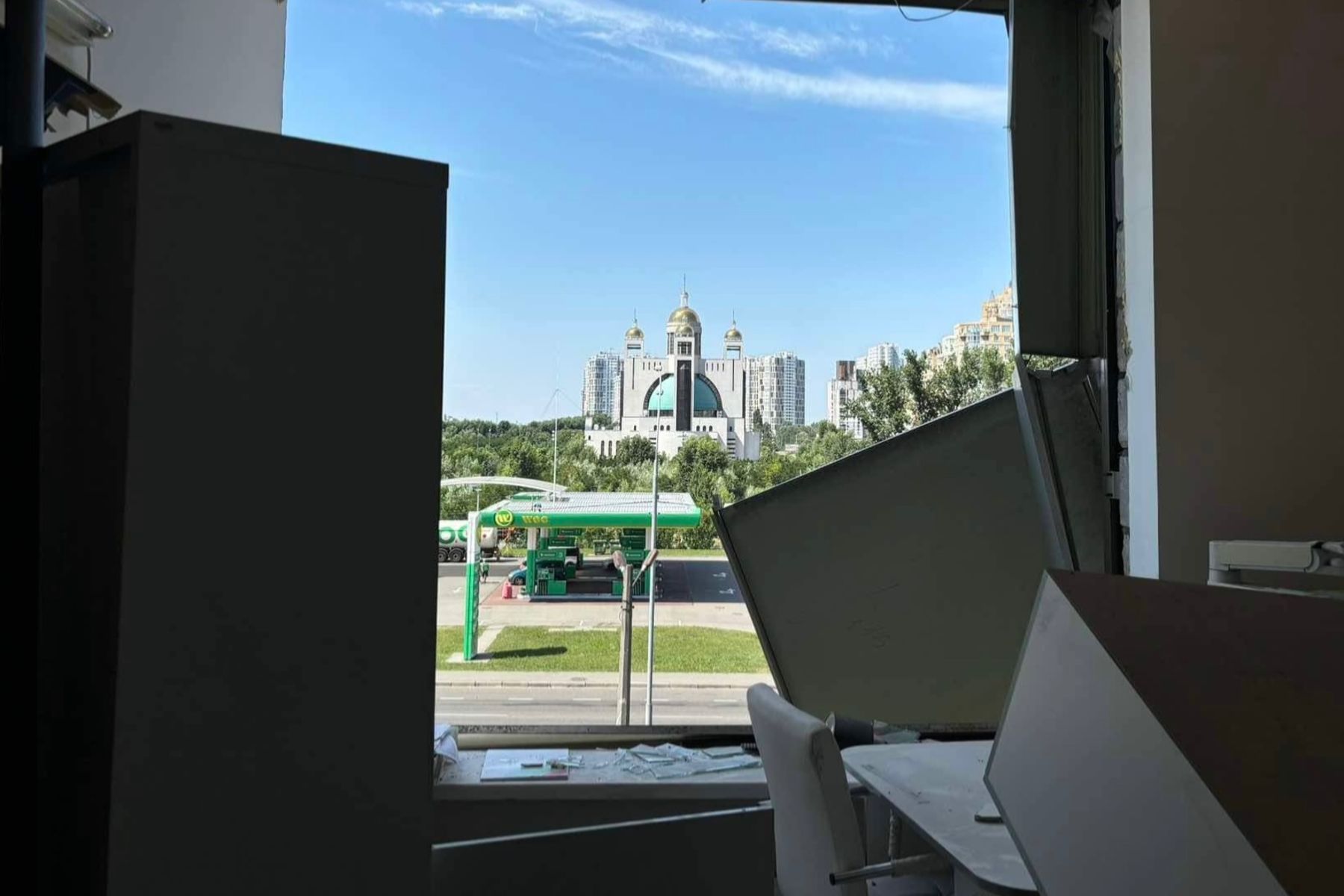
Ukraine and Our Common Hope. The Speech of the Head of the UGCC in Berlin
The Speech of the Father and Head of the Ukrainian Greek Catholic Church His Beatitude Sviatoslav Shevchuk to the Catholic bishops and government officials of Germany at the St Michael’s Reception on 10 September 2024 in Berlin.
Esteemed Herr Bundeskanzler!
Ministers of the government, members of the Deutsche Bundestag!
Dear Bishop Bätzing!
Dear Prelate Jüsten!
Your Eminencies and Excellencies!
Dear brothers and sisters!
First of all, thank you, Bishop Bätzing and Prelate Jüsten, for your invitation to speak at the St. Michael’s Reception this year.
Your gracious hospitality is yet another sign of your big-hearted solidarity with the wounded but unbroken Ukrainian nation.
Esteemed Chancellor Scholz, Members of the Cabinet, Minister Schulze and Faeser, and Members of the German Bundestag,
I thank you:
You help the Ukrainian Army defend the innocent.
You stand against tyranny and international aggression.
You support a truly just peace.
You work tirelessly for European unity and international justice.
I am very grateful for your commitment as is the Ukrainian people.
And to you all, gathered here tonight at the St. Michael’s Annual Reception:
Your gracious hospitality is yet another sign of your big-hearted solidarity with the wounded but unbroken Ukrainian nation.
Your country has warmly received well over one million forcibly displaced Ukrainians. You help the Ukrainian Army defend the innocent. You stand against tyranny and international aggression. You support a truly just peace. You work tirelessly for European unity and international justice.
For the nobleness of Germans and the decency of the European Union, for the hope that you share with us, I express the profound gratitude of all Ukrainians.
We are approaching the thousandth day of the full-scale Russian war against Ukraine. 1000 days of air raid sirens throughout the country. 1000 days of carnage, terror, and death. Ten years have passed since the initial act of aggression with the annexation of Crimea and war in Donbas.
What will force Putin to abandon his declared plans to destroy my people, country, and Church, obliterate an international order based on law and human rights, and expose the purported “impotence of the democratic world?”
Only the grace of God, along with our moral clarity, unity in courage, and decisive action.
This war has turned into a marathon in which Ukrainians must constantly run at sprint speed so as not to be defeated in a deadly race. I ask you to run with us—fast, firm, and fearless.
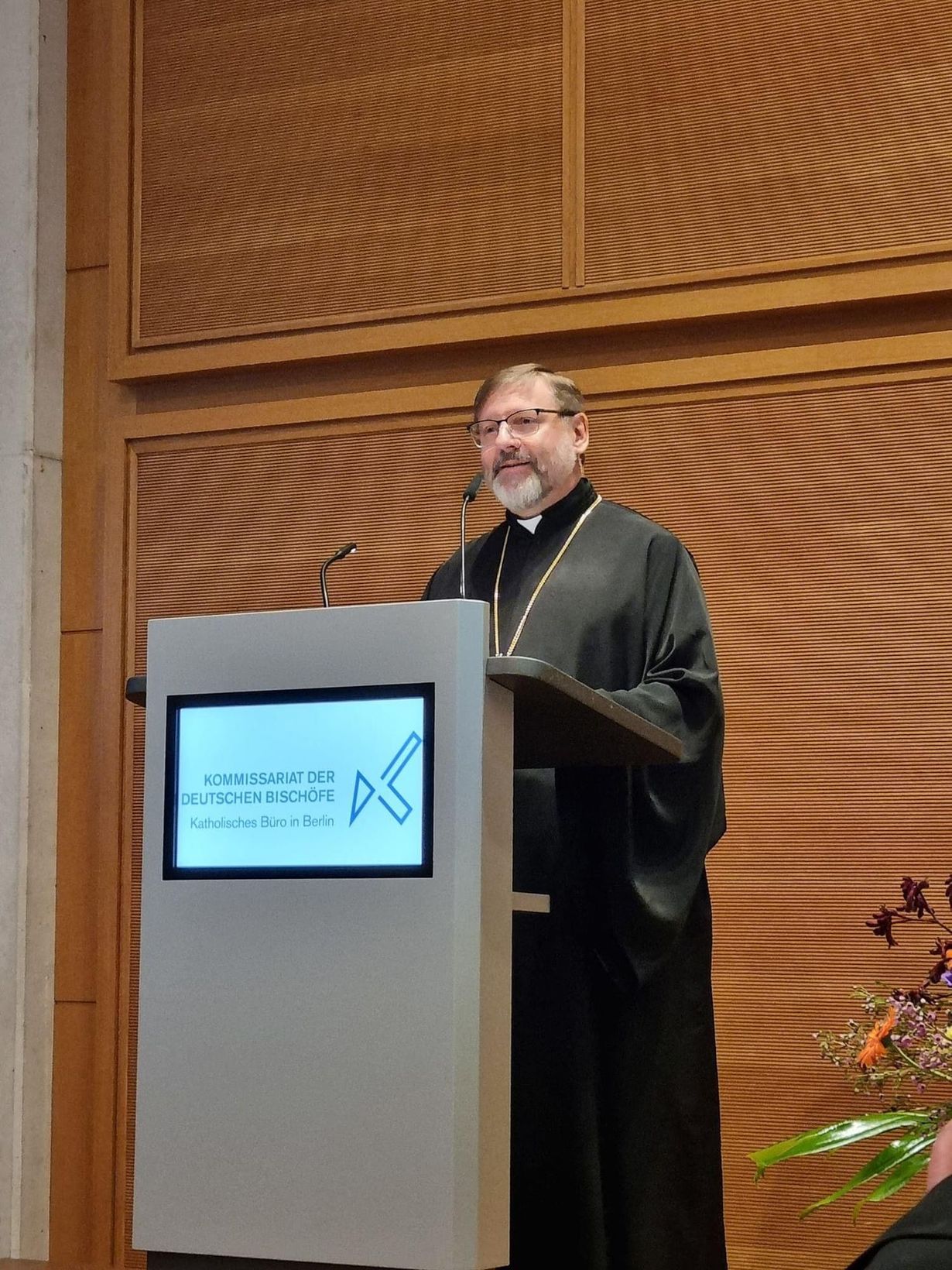
The Church as Sign and Herald of Hope
I address you as a representative of a Church, as a pastor of people entrusted to my care. At the same time, I stand before you as a member of a nation that experiences an excruciating war unseen in Europe since World War II.
I am not here to complain and carp. My desire is to bring hope, to encourage you, and share with you the source of our strength and resilience. We have a job to complete together. The genocides of Hitler and Stalin cannot be repeated.
What can we do? The Church has only the power that comes from following God’s will and commandments, from witnessing to the reality that God is the lord of history. The Church’s strength lies in her unshakable belief in the promise of God that he “gives justice to those denied it, gives food to the hungry, gives liberty to prisoners, …protects the stranger, he keeps the orphan and widow” (Ps 146, 7,9). God is always on the side of the innocent victim. So, he is with us and that he stands with us.
The Church’s strength lies in her unshakable belief that, in the end, despite all trials and tribulations, good will triumph over evil, truth will prevail over lies. You share this conviction, as do all people of good will. The Christians and people of faith in Ukraine are called to be a source of hope and consolation for those who endure unspeakable trials and desperately look for solidarity and support.
For centuries, our Church has accompanied her people in joys and sorrows. Our bishops, priests, and religious continue this witness. Despite deathly danger, they remain with the people to the end, also in the occupied territories. They are imprisoned, tortured, and humiliated.
My own life is marked by the way of the cross of our land. I was elected head of the Ukrainian Greek Catholic Church in 2011. Eleven of the fourteen years my ministry have been under the cloud of war. In Kyiv and throughout the country, from the beginning of the full-scale invasion, I accompany and address our faithful and all Ukrainians daily with words of encouragement and hope.
When I asked the mayor of Kyiv, former world boxing champion Vitali Klitschko, how best to serve the citizens of the capital in these difficult times, he said: “More than bread and clothes we need from the Church a word of hope. Be a sign and herald of hope!
Therefore—we stand, we struggle, we pray.
And we know that you stand with us and encourage us. I thank you for our encounter today because it is an opportunity for mutual inspiration.
The Church Shares the Fate of the Nation
There can be no doubt about the utter ruthlessness and wickedness of Russia’s geopolitical, genocidal intentions. Putin has expressed them unambiguously and will stop at nothing—until he is stopped. Putin sent an assassin to kill in Germany. For years he denied this until last month he welcomed the convicted killer Vadim Krasikov as a hero, a faithful FSB agent and hitman, an old colleague from a St. Petersburg rifle range, who completed a mission in your country sent by the president of Russia.
The pandemic of war has spread all over Russia’s society. The collective Putin means millions of accomplices. The evil ideology does not hide that it aims at eliminating Ukrainians and bringing the final solution to the Ukrainian question. They demand this publicly.
The World Russian People’s Council led by Patriarch Kirill of Moscow has called the Russia’s invasion of Ukraine a “holy war”. They sent a hazardous message to the Christian world which must not be overlooked and underestimated. They justify the evil. They weaponize the Church and the religion.
Putin mercilessly brutalizes populations to achieve his geopolitical goals. He thought nothing of occupying part of Georgia, razing Grozny and Aleppo, sending Wagner mercenaries to terrorize African peoples, or forcing millions of Syrians into exile to manufacture chaos and division in your society. In each of these contexts Russian soldiers committed war crimes and crimes against humanity—for which he demonstratively rewarded them with high military honors.
The massacres and mass graves of Bucha, Irpin, Borodianka, and Izium, the bombing of the maternity ward and the drama theater in the city of Mary, Mariupol, July’s missile strike at the Okhmatdyt children’s hospital in Kyiv, the 13 million people forced from their homes (eight million refugees and five million internally displaced persons—IDPs) are all crushing reminders of the bitter fruits of Putin’s neo-imperialist plan.
Our people know that Russian occupation brings the mass abduction of our children, the rape of our women, the forcible conscription of our men to a Russian army that kills their own brothers and sisters, and the imposition of a Russian-fascist or “Rashist” (Ruscist/Russist) identity upon our youth.
You know it well. The ongoing Russian aggression against Ukraine is predicated on deliberate devastation of civilian infrastructure across the country. Data gathered from open sources illustrate the ruin. Some 1.4 million homes, affecting 3.4 million people, have been either damaged or destroyed. Educational institutions have suffered immensely, with 3,793 schools and universities subjected to bombing and shelling. The healthcare system has also been devastated, with losses amounting to $3.12 billion: 1,736 medical facilities damaged or destroyed, and 212 health workers killed. Religious sites have not been spared. At least 630 churches and religious facilities have been destroyed or damaged.
The transportation system has been ravaged, with an estimated 25,400 kilometers of roads and 344 bridges either destroyed or damaged, disrupting crucial connections. The wreckage also extends to 18 airports and civilian airfields, along with at least 126 railway stations. The destruction has affected some 212,000 private vehicles as well, amounting to approximately $1.9 billion in losses. The Zaporizhzhia Nuclear Power Station, the largest of its kind in Europe, has been seriously impaired by Russia’s attack and remains under occupation. In August of this year, in response to the Ukrainian Kursk operation a fire was set at the station. There is grave international concern that the occupiers may use the facility as an instrument for nuclear terrorism.
Not the last of Putin’s aims is to destabilize Germany and all of Europe by any means possible, including demography and ethnic cleansing. His invasion of Ukraine forced eight million refugees to flee to the European Union. He intends to further depopulate our country by a broader, in fact total, occupation that would send at least ten more million to the EU. One can only imagine how this would affect Germany. Ukrainians are paying a great price to make sure this does not occur. Our religious communities stand in solidarity with those who suffer atrocities and sacrifice to defend Europe, to stop Putin and his stratagems at his boarders.
If Putin succeeds in occupying the whole of Ukraine, all Ukrainian churches will be obliterated.
Our Church has already been banned in the occupied parts of Ukraine. On December 26, 2022, the activities of the Ukrainian Greek Catholic Church were declared to be in “violation of legislation on religious and public organizations of the Russian Federation.” Almost all our parishes have been destroyed, churches and monasteries have been confiscated, and property has been looted.
In the past three centuries, every time that Russia has occupied any land with an Eastern Catholic population, it has either converted it to Russian Orthodoxy by force, driven it into exile, or sent it to perish in the Gulag.
And yet after each attempt to annihilate us we live and witness.
Our Church is an integral part of society, and we remain with our flock in circumstances of death and iniquity. Proximity and faithfulness to our own people entail sacrifice and often occasion great peril. Two Ukrainian Greek Catholic priests, Redemptorist fathers, Bohdan Heleta and Ivan Levytsky, have recently returned from Russian captivity after over 1.5 years of imprisonment, torture, and humiliation.
Our solidarity and resilience come at a cost, as does yours.
In the face of evil, there is no other way.
As a pastor I share the pain of the families of the hundreds of thousands who have been killed and injured, the millions who have been forced from their homes and their land and have lost everything. I implore you not only to continue but to enhance your support for Ukrainians in their struggle for freedom and dignity.
I would also like to address certain myths about Ukraine that can distort the West’s vision, obscure proper ethical perspective, and inhibit decisive action.
Ukrainians want peace
Nothing is more distant from the truth than saying Ukraine does not want peace. No one wants peace more than Ukrainians. Unlike Russia, whose leader declares that the dissolution of the Soviet Union was “the worst geopolitical catastrophe of twentieth century,” we rejoiced over the liberation from the red empire of evil. We moved to join the democracies of Europe and the world for whom the virtues of freedom, justice, respect of the rights and dignity of persons and nations are fundamental.
We contributed in a singular, visionary manner to building global peace and freedom. As Pope Francis noted, so many forget that thirty years ago, three years after independence, in December 1994, Ukraine disarmed its nuclear arsenal—at the time larger than those of the United Kingdom, France and China combined. It would be appropriate to commemorate the anniversary of this precedent publicly in Germany and in the EU. If I may be so bold to propose: this prophetic step deserves a Nobel Peace Prize.
Instead, Ukraine was punished with war by one of the signatories of the nuclear disarmament agreement, by a partner that pledged to defend Ukraine’s sovereignty and independence. Ukraine has the moral right to expect that other guarantors, together with the entire democratic world, will help protect our sovereignty and territorial integrity.
Ukraine experienced peaceful revolutions in 1990, 2004, and 2013 and demonstrated its profound commitment to human rights, democracy, and freedom. We were able to assure freedom of the press and public expression, religious freedom and the peaceful coexistence and fraternal collaboration between the Churches and religious organizations. The most recent decisions taken by the Ukrainian Parliament in the sphere are aimed at preventing the weaponization of religion and spiritual aggression against our freedom.
Our country conducted peaceful power transitions from one president to another until Russia disrupted our democratic cycle by trying to impose its autocratic ways. Today, the free world recognizes Ukrainians for holding sacred democratic principles even during a time of martial law, which understandably leads to the concentration and centralization of power.
Ukrainians crave and long for peace as no one else. It is Ukrainians who endure untold suffering, who lose their family members, who are crippled and traumatized by the cruelties of the war. We want peace with all our hearts, all our souls—but a just peace, because only a just peace will be authentic and sustainable.
Overcoming stereotypes
Russian propaganda aims to discredit our nation, to convince Europeans that it is not their war, and to make them (you) believe that there is no way to impede Russia’s neo-imperial agenda and stop it from achieving its expansionist and revisionist objectives. It portrays Ukraine as a “failed state,” a traumatized society with no authentic national identity. It presents Ukraine as an aggressive threat to Russia, as unwilling to conduct realistic peace negotiations, and as unreasonable in its insistence on a just peace.
Unfortunately, one can hear such opinions not only from the official Russian media and propaganda outlets but also from respected scholars, public intellectuals, and politicians in Western countries, including Germany. For the sake of their own security, Western democracies need to examine how malicious regimes can abuse freedom of speech and distort the truth while avoiding accountability.
In their appeal “Friede diesem Haus” (Peace to this House), the German Catholic bishops rightly pointed out that “War as politics by other means, and the right of the stronger, have therefore advanced once more to become patterns of international politics which are not legitimate, but are used without reserve especially by autocratic regimes when they deem it necessary.” The bishops warn: “If the Kremlin manages to achieve its war aims, there is concern that it will continue its revisionist policy of restoring the Russian Empire by military means.” (# 84).
Overcoming fear
Russia trades on fear and dread. It threatens Western populations with direct military conflict with NATO. It intimidates with scenarios of a World War III and nuclear attack. It fuels anxiety and panic in the West.
Fear is a bad advisor. We must never discern and act out of fear. Spiritually, the best way to overcome fear is to confront it with meaningful action for the sake of the good. When we stand in solidarity around virtues our anxiety subsides.
Let me share with you the story of Father Herman Budzinskyi. He was a priest in the catacombs during the Soviet persecution of the Ukrainian Greek Catholic Church. Over four decades the faithful monk was arrested and unjustly convicted several times. He spent many years in prison. After Fr. Herman was released from one of his terms in the Gulag, he began collecting Soviet magazine articles defaming the Church. He wrote a thorough repudiation of the libelous texts and sent it to the same media outlets. For this he was again arrested, convicted, and sent to prison. After the Wende, he was asked why he repeatedly confronted the Soviet authorities, why he was not afraid. Fr. Herman responded: “In fact, I was afraid. But what comfort I felt in overcoming my fear. What joy I felt when I was liberated from it!”
Overcoming illusions
Fear often begets illusory hopes and schemes for a quick, low-cost, corner-cutting peace. Such mirages are dangerous for several reasons.
First, there may be a temptation to equate a facile ceasefire with peace. A peace naively imagined and heedlessly enacted will turn out to be a short-lived truce, after which the rewarded aggressor will return rearmed, stronger, and more voracious than before. Russian leadership craves the reconstitution of the Empire in its Soviet dimensions, openly and explicitly. It is simplistic and foolish to think that it will be satiated with Crimea and Donbas. The consumption of Ukraine is just the appetizer. The Baltic, Caucasus, and Central Asian nations have no illusions that they would be the next course. Neither should anyone. The words of the Apostle Paul should be a warning: “While people are saying, ‘Peace and security,’ then sudden disaster comes upon them…” (1 Thessalonians 5:3).
Second, neither the world’s democracies nor the Church should endorse a peace that accepts aggression as a successful method of appropriating another nation’s sovereign territory. This would be a fatal blow to world security, as it would encourage all other potential aggressors. The more we ignore values and ethical principles by making concessions to an invader, the more arrogant the aggressor becomes, and the less secure we turn out to be. “Building bridges” to evil only feeds its delusions of grandeur. For this reason, global democracies need a new roadmap for just peace that will obviate the false logic of appeasing the aggressor.
Based on his experience of two world wars, the legendary head of our Church (1901–1944), Metropolitan Andrey Sheptytsky, wrote: “Everyone understands that a peace that would not take into account the needs of peoples and in which peoples would consider themselves offended and would in fact be offended would not be any peace, but rather the cause of new and worse complications and mutual hatreds that would necessarily lead to new wars.” (“Про почитання і посвяту себе Пречистій Богородиці”)
I recall with gratitude the words of German Federal President Frank-Walter Steinmeier in September 2022 at the opening of the 11th Assembly of the World Council of Churches in Karlsruhe: “We know: Prolonged injustice is itself violence — and it always leads anew and again to violence, terror and war… The work of justice will be peace: this ancient message of the prophet Isaiah still applies, and it must guide our actions.” We know from our common European history that unpunished and unrepented evil will find a different incarnation and come back in the future, more wicked, dangerous, and destructive.
Third, a peace agreement makes sense when there is confidence that all its signatories will honor their commitments. Treaties presupose trust—at least some. But let us ask ourselves: is there a single security agreement between Ukraine and Russia that the latter has not violated? In fact, there is none. On what basis can we assume that Russia will keep its word? After all, it openly denies Ukraine’s legal status as a state, its very right to exist. And, as the aforementioned failure of the 1994 Budapest Memorandum shows, the pledges of other states as guarantors do not necessarily deter Russia. Thus, it is politically mistaken and strategically imprudent to believe that the logic that guides democratic nations and peoples applies to or sways totalitarians and dictators.
Ukraine needs and deeply desires a true, just, sustainable peace not a fleeting, illusionary truce.
Overcoming disappointments
Russia tries to portray Ukraine as the most corrupt country in Europe, if not the world. I do not suggest that there is no corruption in Ukraine or diminish the impact that corruption has on Ukrainian society. No society has immunity against this disease. However, I am convinced that this disease is curable.
Civil society as the main protagonist of the battle against corruption is strong enough to contain the threat and cure the disease. Corruption is appalling. Its eradication is necessary to win peace in Ukraine and should constitute a new social agreement in the post-war future of the country.
An anti-culture of corruption based on double standards, lies, and survival strategies characterized the Soviet system. It stole all from the people so people stole what they could from the system. This post-communist legacy was exacerbated by Russia’s policy of exporting corruption. Russia corrupted our political elites, our media, and our pop culture. These ploys do not stop at the borders of the former USSR. The offer of financing, cheap energy, and trade privileges continues to buy international acquiescence not only to the invasion of Ukraine but also to the violation of human rights in Russia. It is easy to fall prey to the adage that “money does not smell.”
War is a traumatizing experience, and corruption often thrives during such cataclysmic events. But we also witness the strenuous efforts of those who want to stamp out corruption in Ukrainian society. Making ultimate sacrifices Ukrainians demonstrate that they want to build a society grounded in the rule of law, transparency, and accountability. These values ultimately are rooted in the Gospel and expressed in Catholic Social Teaching.
Corruption has no chance to thrive if Ukraine wins peace and becomes part of the European Union. In fact, I believe that had Ukraine received an invitation to join the EU back in the 1990s along with Poland and other CEE countries, it would have been given powerful leverage to fight and eliminate corruption much earlier.
War is a sobering experience. It makes people reconsider and transform their way of life. We will win the war against Russia and the war against corruption.
With your help. For our mutual welfare. We have no other viable choice to preserve our existence and safeguard our dignity.
Today, Ukraine is experiencing the Paschal Mystery and is accumulating immense spiritual capital based on the virtue of self-sacrifice. These moral resources will bring social and economic dividends. Today Ukraine is paying the highest price for freedom, truth, and justice and is demonstrating its moral commitment to a democratic and law-abiding social, political, and economic future.
War in Ukraine as a Test of Our Humanity
Respect for human dignity and human life is at the core of Catholic Social Teaching and of democracy. The authentic quest for these principles is the fundamental difference between our countries and totalitarian and authoritarian regimes, including Russia. If a person is aware of his or her own dignity and that of fellow citizens, and strives to preserve, indeed enhance it, he or she is capable of overcoming fear and of facing injustice in an ethically compelling manner.
Today, Ukrainian soldiers, medics, volunteers, and chaplains witness to human dignity by risking their lives to save others and allow them to dream and work toward a future of freedom and dignity. I share with you a true story: A severely injured Russian soldier told his Ukrainian captor: “Finish me off.” The Ukrainian replied: “No, we are not like you.”
For many Ukrainians, this war has become a test and a lived experience of human dignity. I am confident they will preserve and integrate this experience translating it into social structures and institutions in post-war Ukraine.
A just end to the war is crucial in this sense. After all, “justice lifts up a nation…”, as Proverbs says (Proverbs 14:34). Conversely, a nation that despairs of the possibility of achieving justice will wither and be unable to overcome its social ills. Injustice does not travel alone. As the psalmist states: “Behold, he conceived injustice, became pregnant with evil, and gave birth to wickedness” (Ps. 7:15).
Ukraine is learning the lessons of democracy in extreme circumstances. It is learning through self-sacrifice. It is embracing principles of freedom and responsibility as authoritarian and nihilistic reflexes reemerge in Europe and as more people become skeptical about democracy and its merits.
Ukraine’s valiant struggle challenges the view that physical safety and material comfort are the only goals of democracy. It teaches us that democracy deserves to be defended at the cost of one’s comfort, health, and even life. Pavlo Kazarin, a Ukrainian journalist who became a soldier, pointed out: “If Ukraine loses, many societies around the world will say: aha, look — they were a democracy, they created space for the competition of diverse opinions, ideas, contexts, meanings, and they lost. Therefore, for the survival of our state, we don’t need all these remnants of the twentieth century. A market economy can be established without them (e.g. China and Russia), and in public life, we can resign ourselves to some form of authoritarianism.”
We can learn a lot from each other. We can be of help to each other in advocating and promoting democracy for the right reasons and for the right purpose. But first Ukraine must win peace.
I ask you to help people in Germany and other Western countries see through stereotypes and overcome fears, illusions, and disappointments. I ask you to explain to them that this is not only a Ukrainian war. It is a war on which the future of democracy depends — in Ukraine, in Europe, and throughout the world. The war against Ukraine is a war against Germany, all of Europe, and the entire democratic order. Unfortunately, it is your war as well. Ukraine needs your support not only for its own sake but for yours.
We live in tumultuous, challenging times. Times of tough decisions, times of sacrifice. But I would like to speak not only of “time” but of our Kairos. We have an opportunity, a special chance, the blessed time, here and now, when the Lord sends his Spirit to overcome the forces of evil that today assault the human person and human society. We believe that God’s Spirit, the spirit of truth, the spirit of freedom, the spirit of love, is stronger than the power of the Adversary. May all of us have the wisdom to contemplate our reality from this perspective. I wish for all of us an evangelical parrhesia to witness to the truth freely, without flinching, to have the courage to make bold decisions and implement them for the good of our common European home.
Together, by contributing to a just end to the war, we will bring about what Isaiah prophesied: “As the earth grows its plants and as the garden grows its seeds, so will the Lord God grow justice and glory before all the nations” (Isaiah 61, 11).
